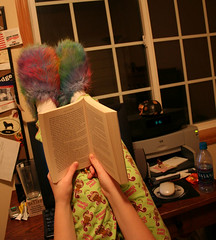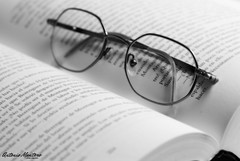I’ll admit it: I love to read, but when I’m writing, I don’t do a lot of reading. (Oh, crud, there’s a secondary confession in there: I typically don’t write [i.e. write brand new material in a first draft] every single day. Gasp.) There are a couple reasons for this. (The reading, not the writing. That’s another post.) When I am writing a book, it usually consumes every second of “free” (read: writing or reading time) time I have for those weeks. But don’t worry—I still get my (non)fiction fix in! Here’s how!
Research!
Occasionally, I can work in a little bit of reading while drafting. For me, nonfiction research reading can often feed my creative beast muse—very important when you push it as hard as I do (we’re talking 4-5000  words/day while drafting).
words/day while drafting).
I have to do a lot of research anyway (since I’m a little obsessive), and research reading is a great source of new ideas. I’m revising and editing right now, and I’m digging deep into my research reading at the same time—and the ideas I’m discovering are fantastic! Man, I wish I’d done this research sooner. Sigh.
Fiction, however, is another story for me. When I read fiction while writing, the voice or style of the book I read often bleeds into the book I’m writing. That usually isn’t so good. So let’s just assume that we’re not going to be reading fiction while drafting, but we definitely can’t take off all our time from reading. What’s a writer to do?
Take a reading break
One thing I try to do periodically, especially when trying to get necessary distance from my book, is to take a break from writing/revising/editing altogether and just read. It’s a good time to catch up in your genre, explore another, try something new or completely different, or just enjoy yourself. Reading breaks are also a great place to find ideas. Way back when I wrote three books in one year (before I did 4–5000-word days!), the thing that got me writing that third book (insanity!) was an idea I just couldn’t resist after reading a fantastic book.
Read carefully while editing
Reading while editing will vary from writer to writer, but for me, I think I actually benefit from reading writing that I . . . don’t care for, we’ll say. If you’ve been editing your own work long enough, you probably rewrite sentences in published novels at least occasionally. (Admit it, we all do!) When you feed your editing habit, you may look at your own writing with a more critical eye.
 On the other hand, I’m sure some writers find it more helpful to read really, really good novels while editing, giving them a mark to shoot for. Me, I go for the petty alternative
On the other hand, I’m sure some writers find it more helpful to read really, really good novels while editing, giving them a mark to shoot for. Me, I go for the petty alternative 
Set a reading goal
And make it public!. I pledged to read 50 books last year, and I thought that wouldn’t be too hard. I’d read 40 the year before (um, including a 6-week leave from all writing while I read [and had a baby]), and even very long books seldom take me a week to read. You know, except for the weeks I can’t, when I’m consumed by my own books (or, heaven forbid, the humans with whom I cohabit)(okay, or the frog)(and Randy makes his blog debut!).
That public pledge ended up pushing me pretty hard, especially since I did NaNoWriMo, too. It came down to the wire, but I got in my 50 books, even if a couple were rereads of some classics of writing craft.
What do you think? Can you read while you write? If not, when do you read?
Photo credits: reading a book—Kendra; glasses on book—Antonio Mantero

Okay, confession time: I am a snail reader. As in, I seem to crawl slowly through books. I didn’t realise I was a slow reader until I read blogs such as yours, or I heard people rave about a book, saying they finished it in one sitting. I could never do that. It’s a combination of a lack of time (as you say, writing takes priority) and the actual speed that I read at. When I was a child I was faster than everyone else, but now it seems everyone else has sped up!
I read on the train during my daily commute: a chapter or two per journey, and then I try to sneak in another few chapters during the weekend. So it takes me about two weeks to read a book, and I generally have around three on loan from the library (with a couple more on reserve). I suppose that’s around 10 hours of solid reading time to finish a book, but I do tend to let my mind drift occasionally (a lot of times to my own WIP!).
I’ll admit I haven’t read an “unputdownable” book in a long time. Even though I’m reading in my genre, I don’t really love the books that much. I’m still trying to find more authors I click with. So sometimes reading that chapter on the train is a chore.
So if I was to challenge myself to read a number of books in a year, it’d be about 20! Sad, right? How many hours of solid time does it take you to read a 350-400 page book?
Oh, hooray, we can all confess today!
Um, I have no idea how long it takes me to read a 350-400 page book. I hear you on the difficulty of finding an “unputdownable” book! That makes such a big difference. A 350-400 page book that I LOVE I can read in maaaybe . . . 10-14 hours, usually spread over two days? (That’s if my husband cooks dinner and the kids are entertained.) Most books I read aren’t quite that long (typically <300 pages), but I do have some particular favorites that fell in that range, that I basically abandoned my life to dive into.
But my reading speed varies. I read novels more quickly than nonfiction, typically. I read books that are due back at the library tomorrow faster than ones I just checked out (sometimes!). I read well-written fiction faster (because I'm not rewriting all the sentences in my head). I read fiction and nonfiction I'm reading for research a little slower, especially with pauses for note-taking.
My husband reads a little faster than I do, and my best friend has devoured as many as six books in a weekend. I have friends on GoodReads who shoot for 100--or 500! (WHAT?)--books a year.
But I think reading is less about numbers and more about refueling the creative beast. If you're reading enough that *you* can enjoy it and get what you need to creatively (and, you know, staying market savvy and all that), then it doesn't matter if you read five or five hundred books in a year!
I LOVE NF for getting those creative juices flowing and I agree about fiction voice bleeding into my work. But sometimes I do that on purpose. I.E. When I’m writing romance I like to read romance. It gets me thinking like a romantic heroine and makes it stronger. I just do my best to read a variety of different authors during that time so I don’t end up unconsciously copying one way of writing. It can be a useful tool especially if you’re struggling to find the voice for a character AND as long as you’re aware of the process (hence the ability to manage it instead of letting it manage you).
Great post!